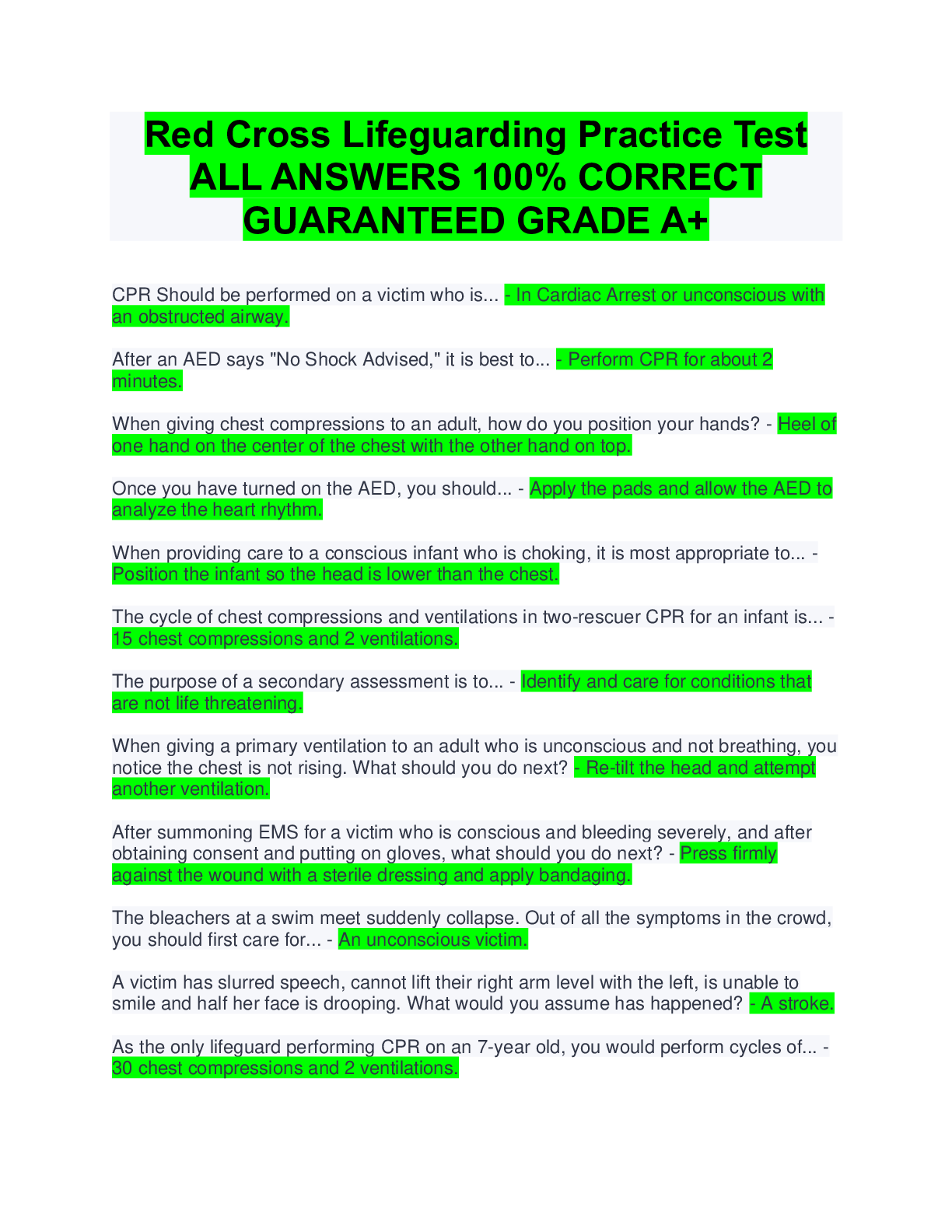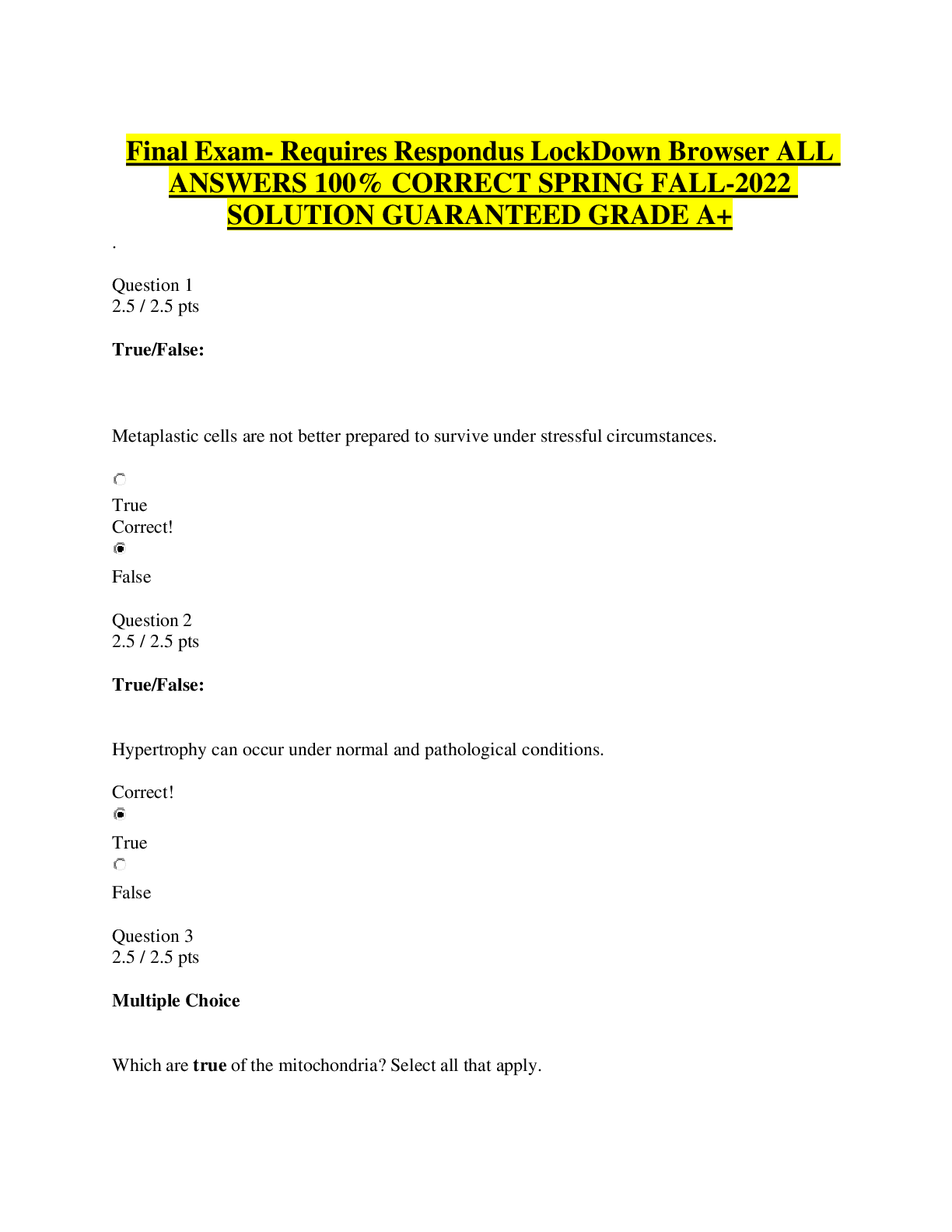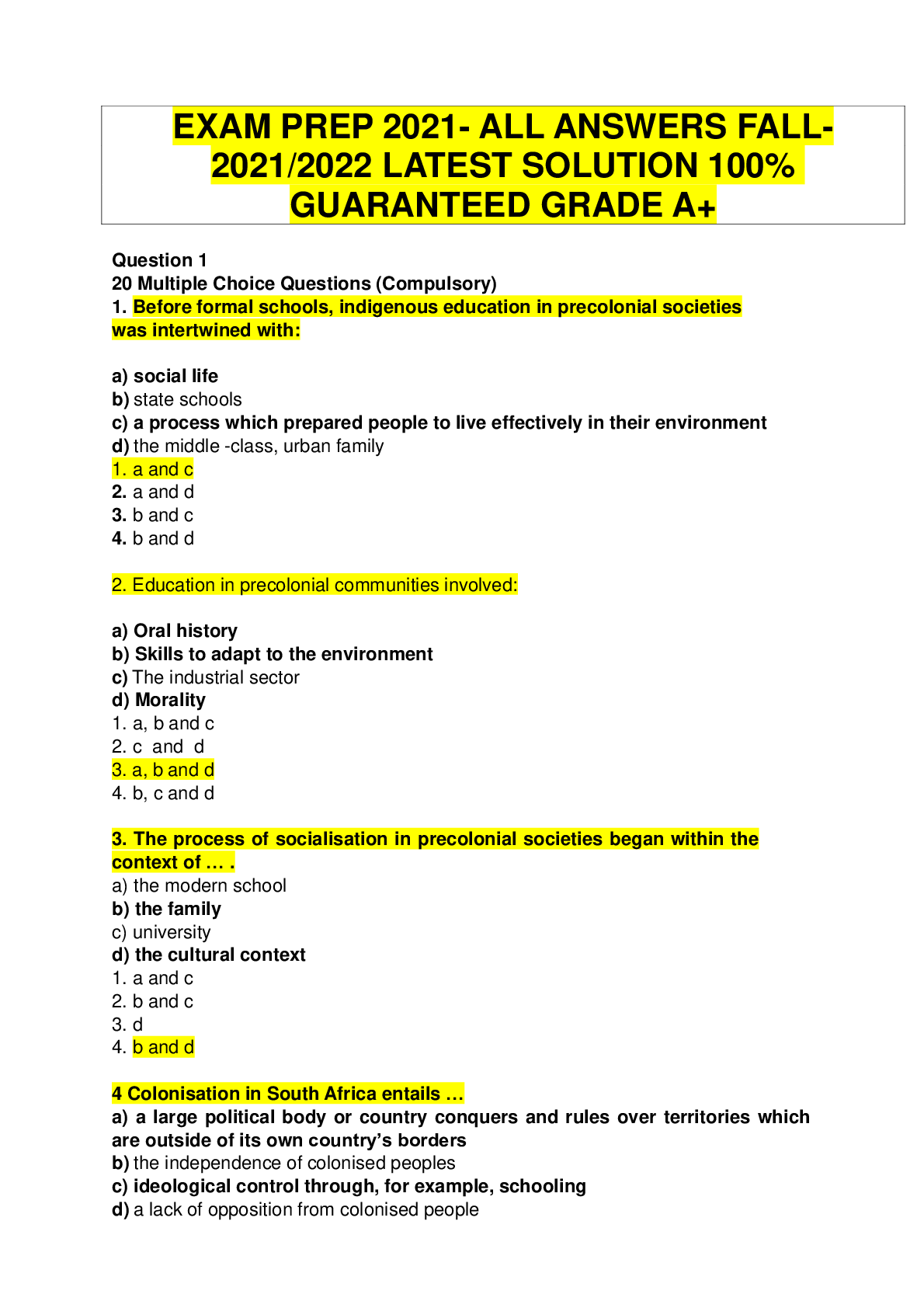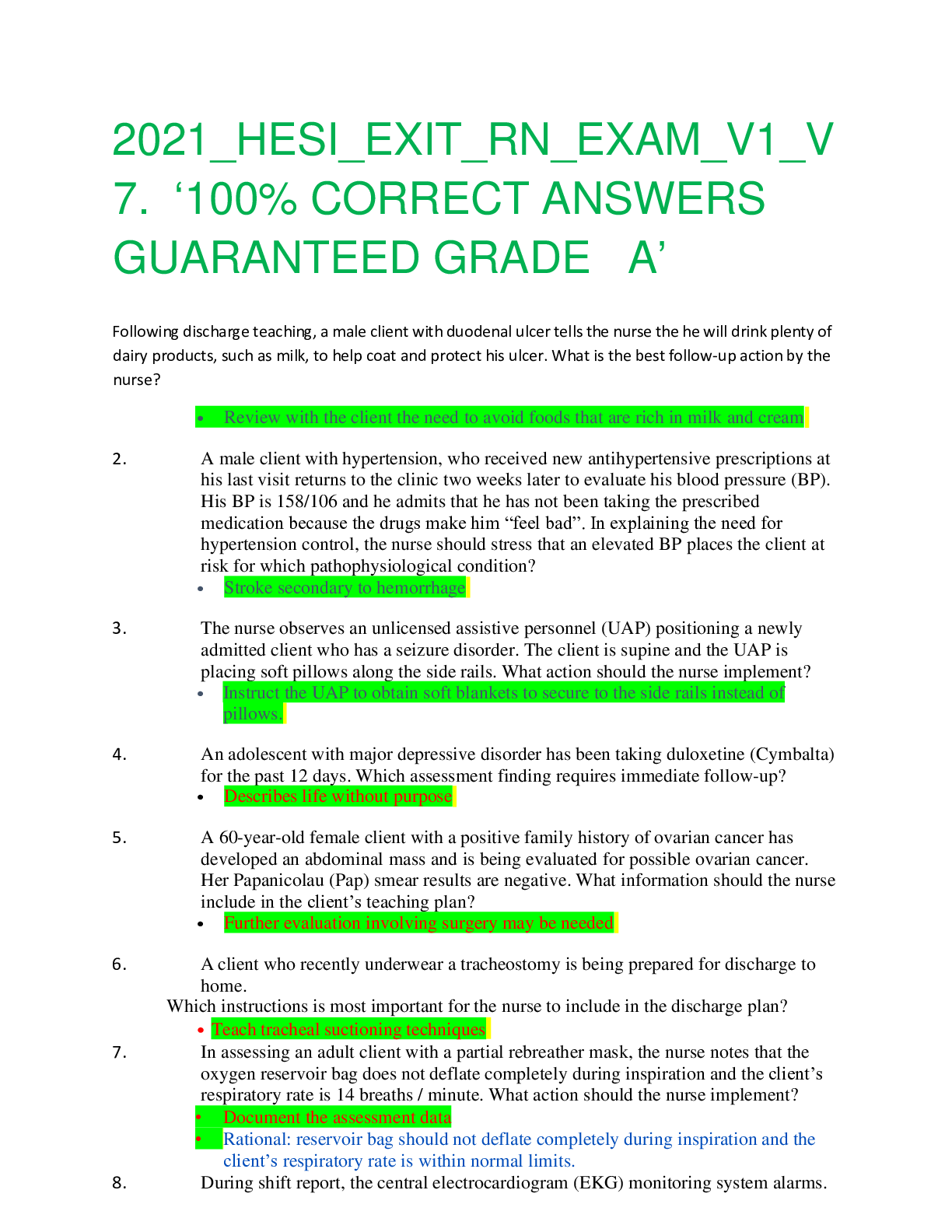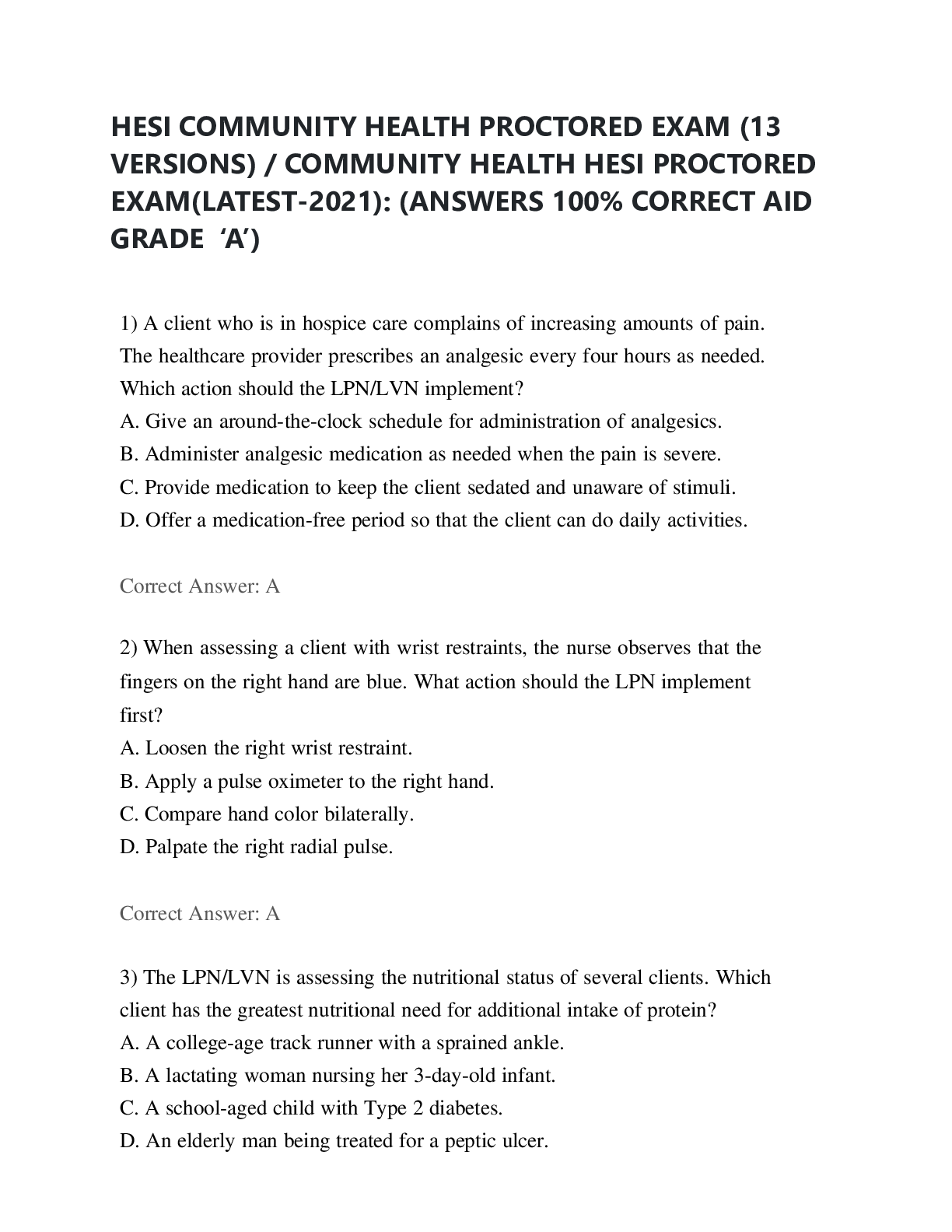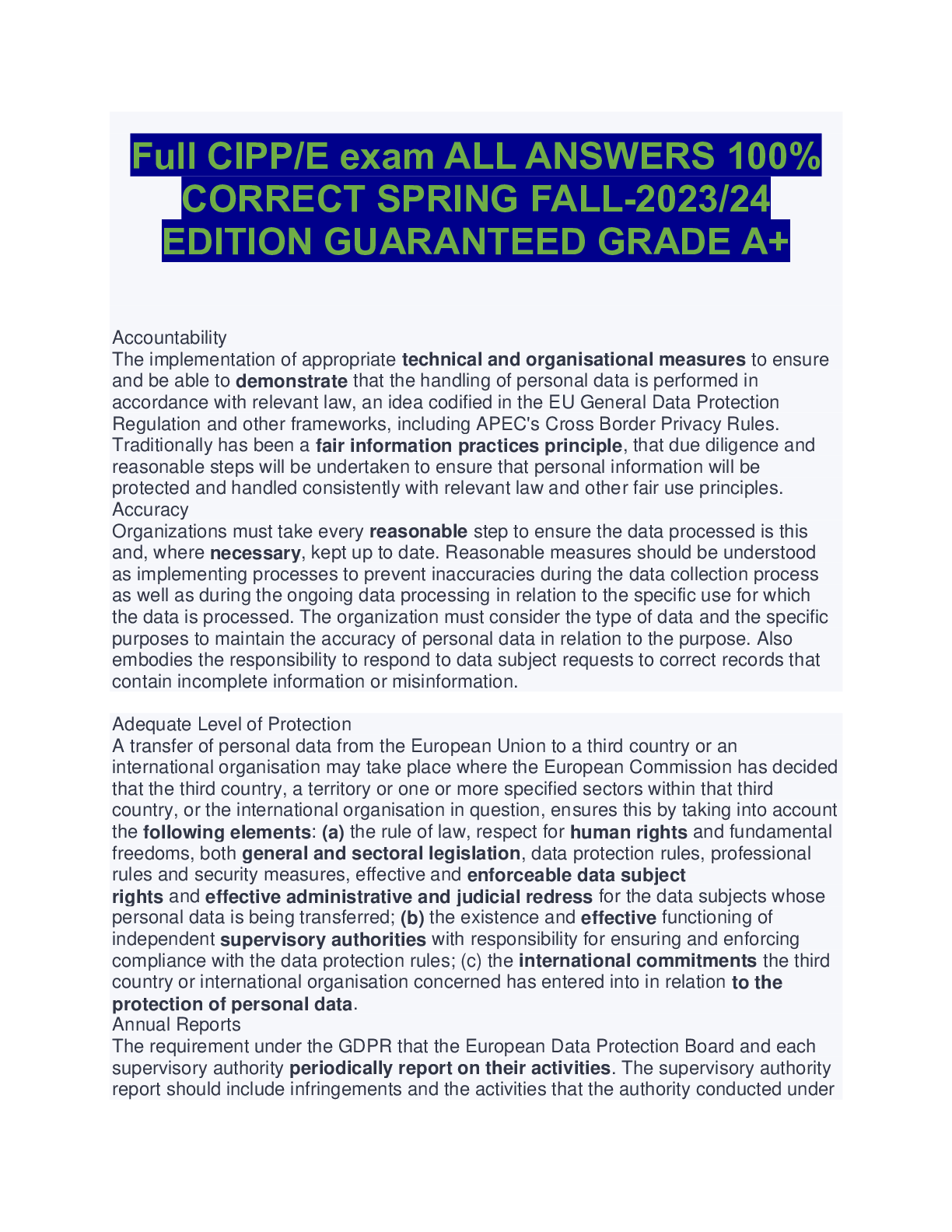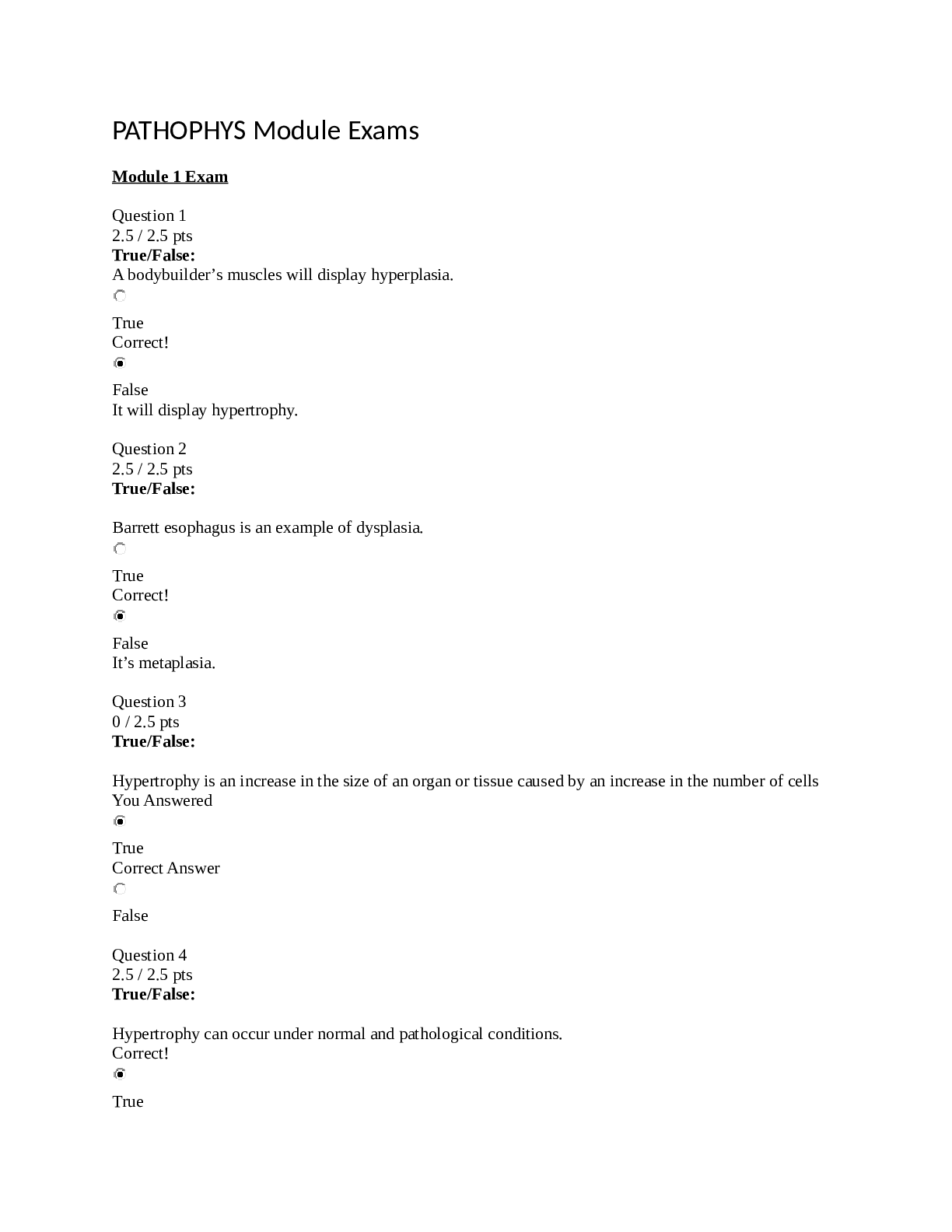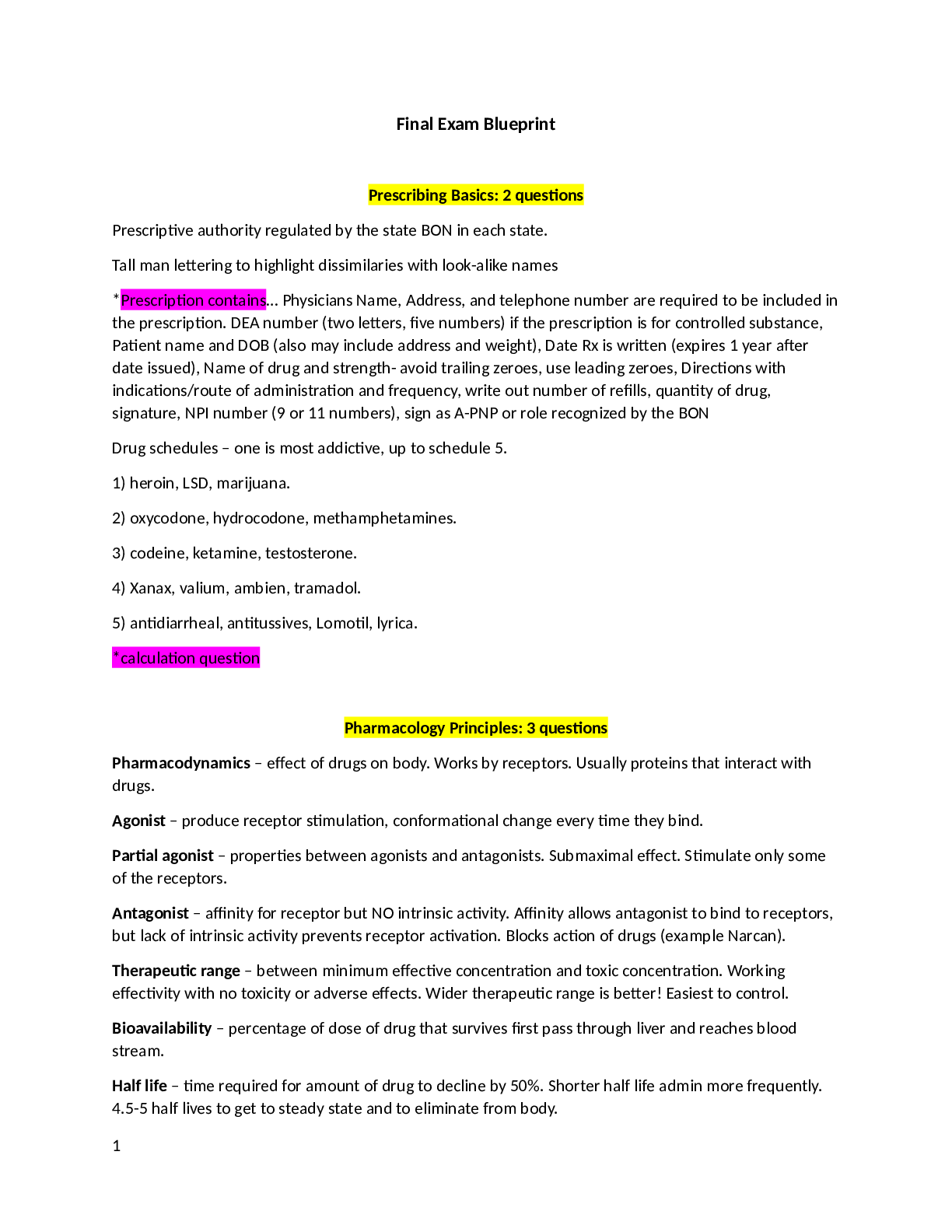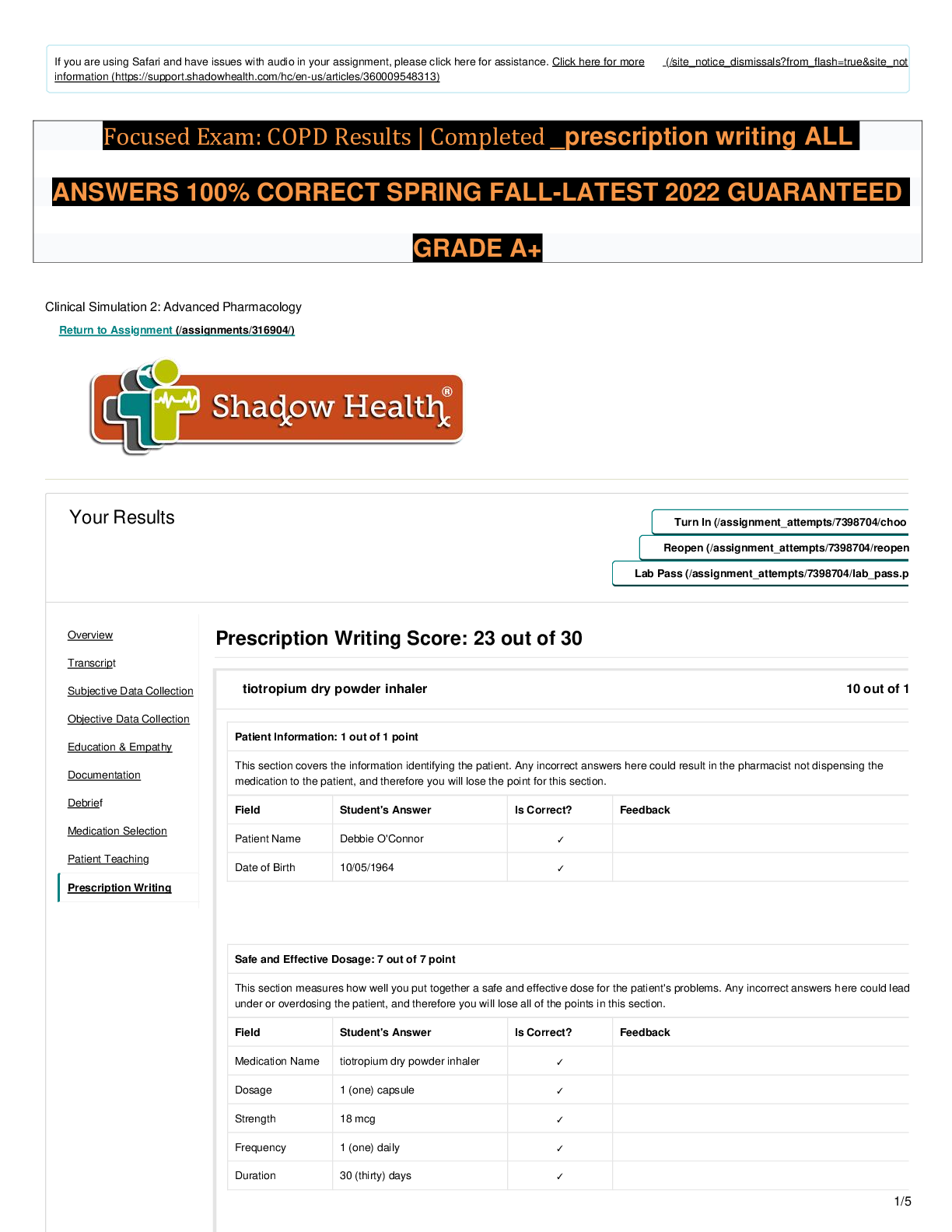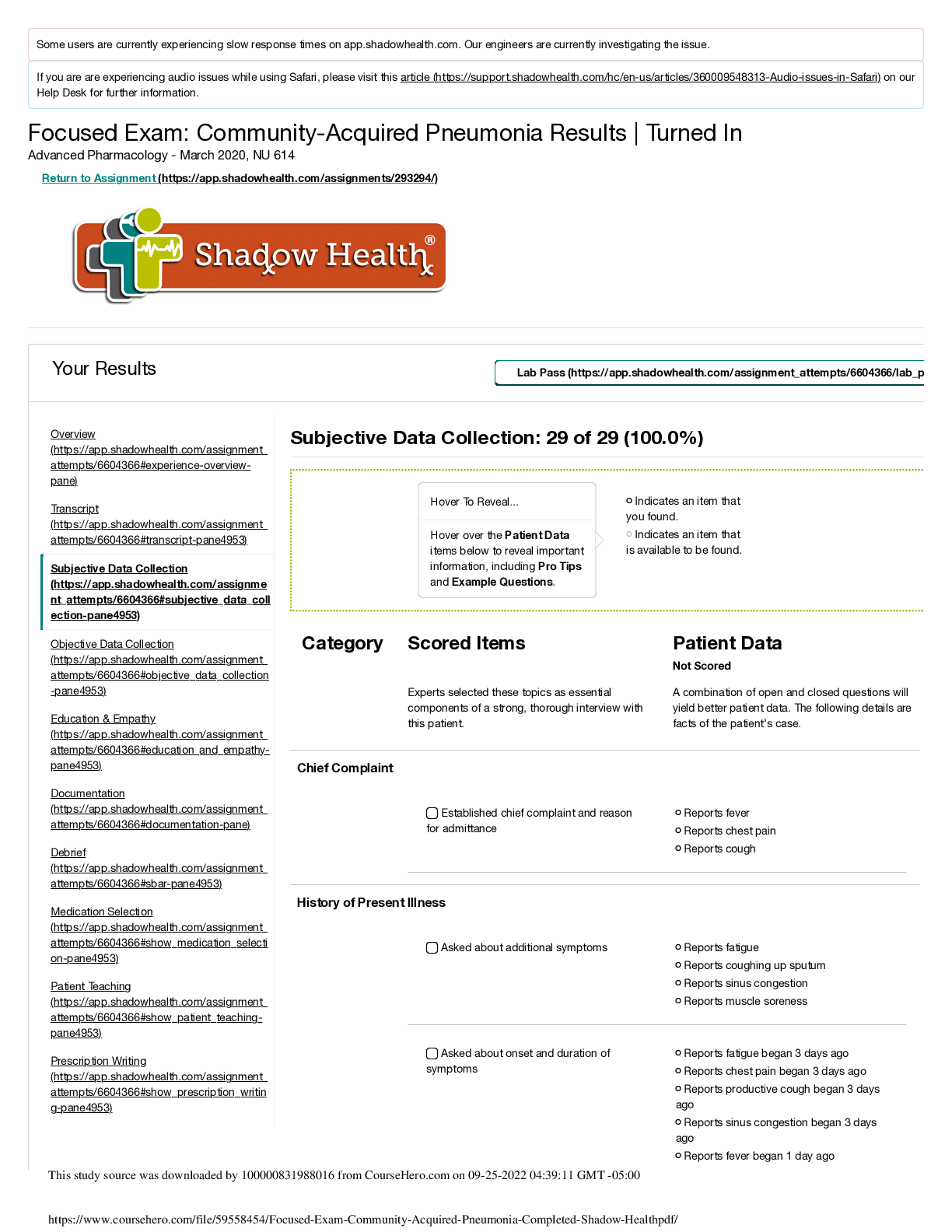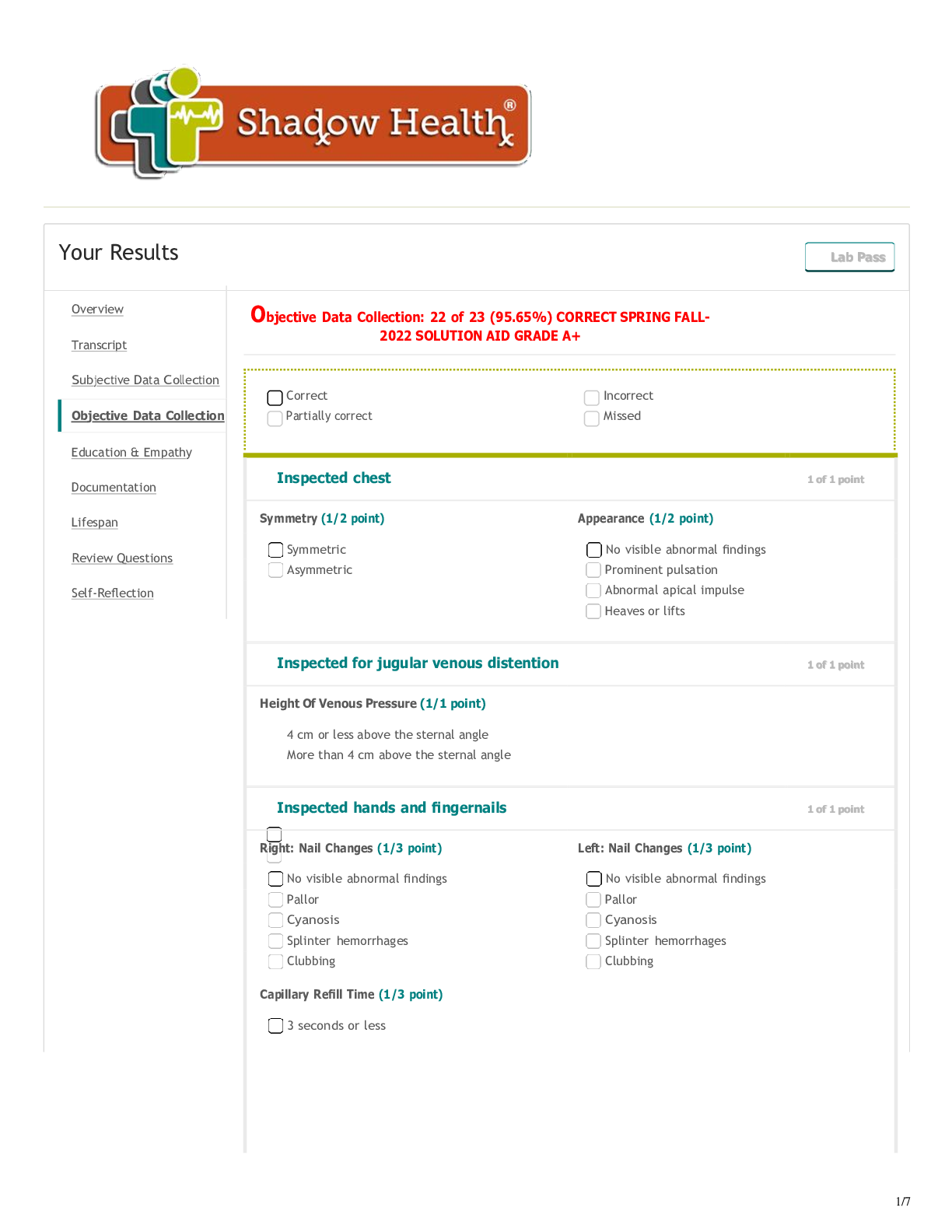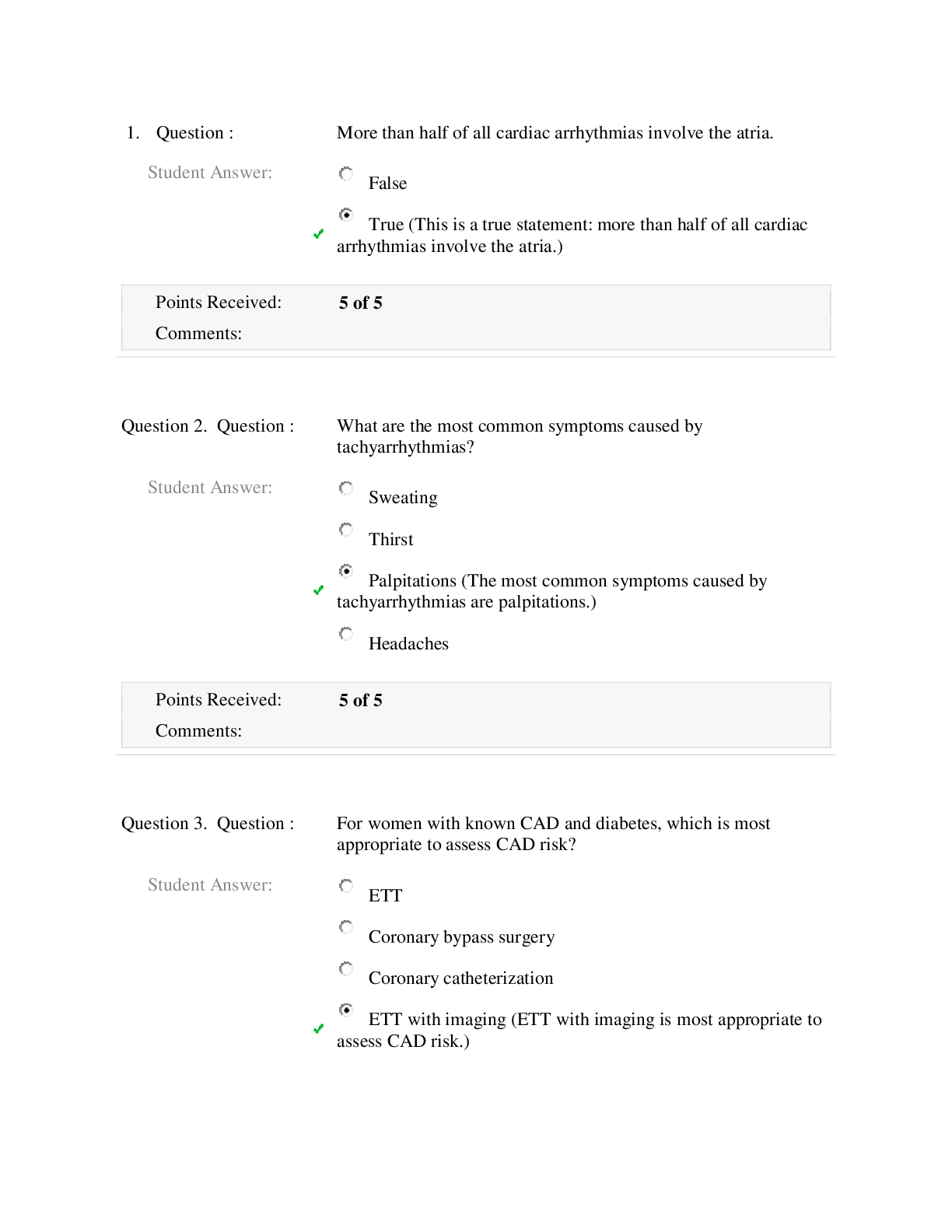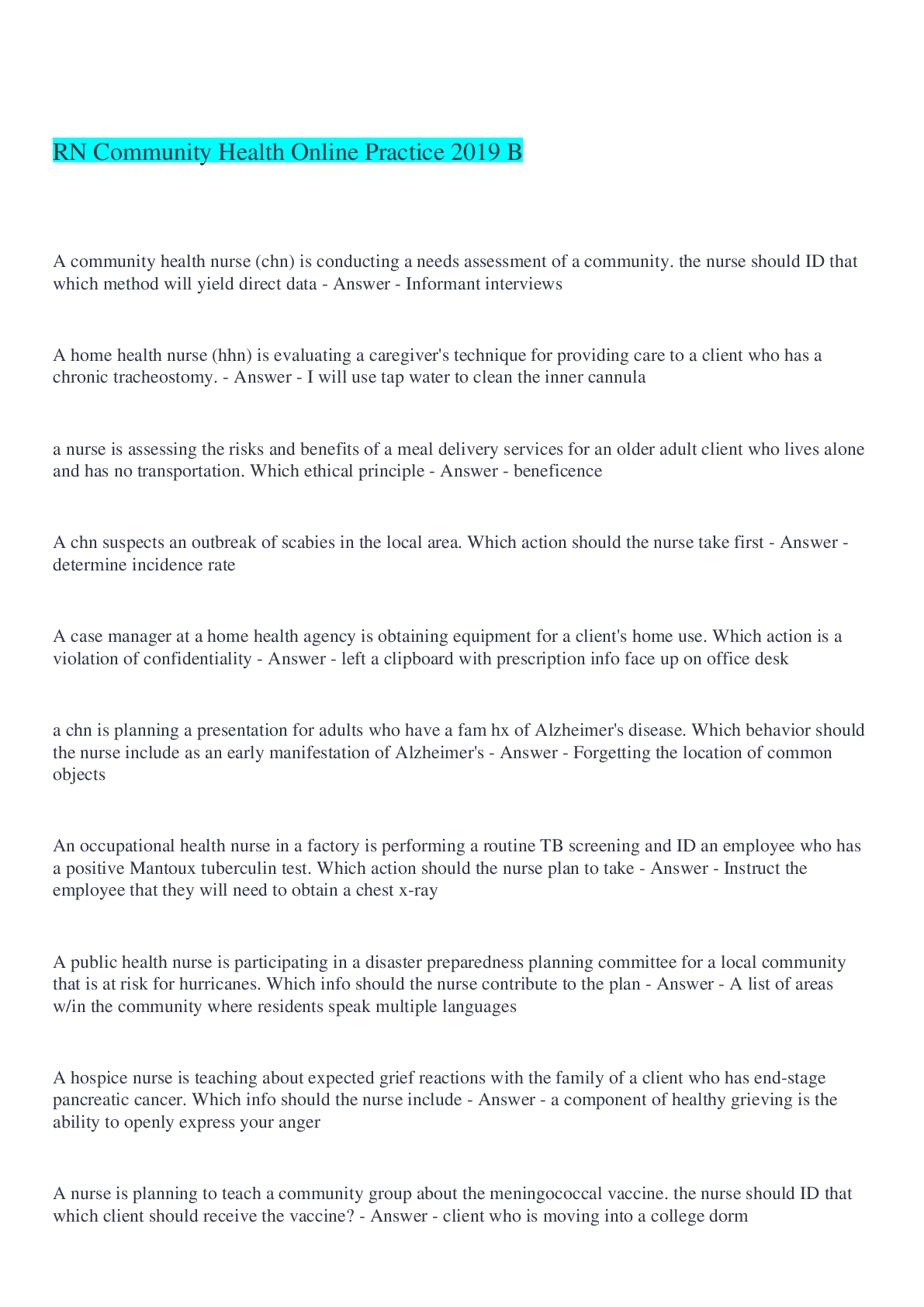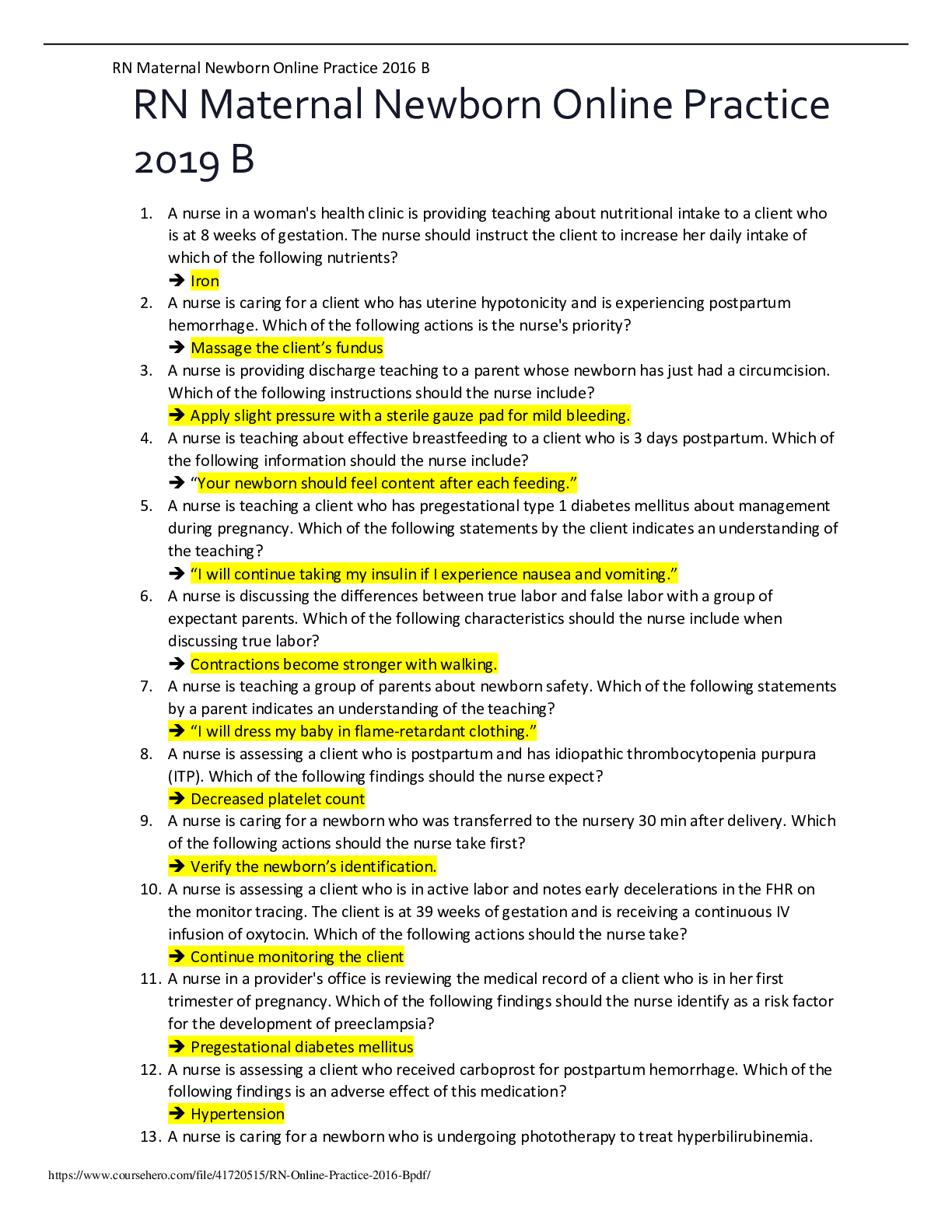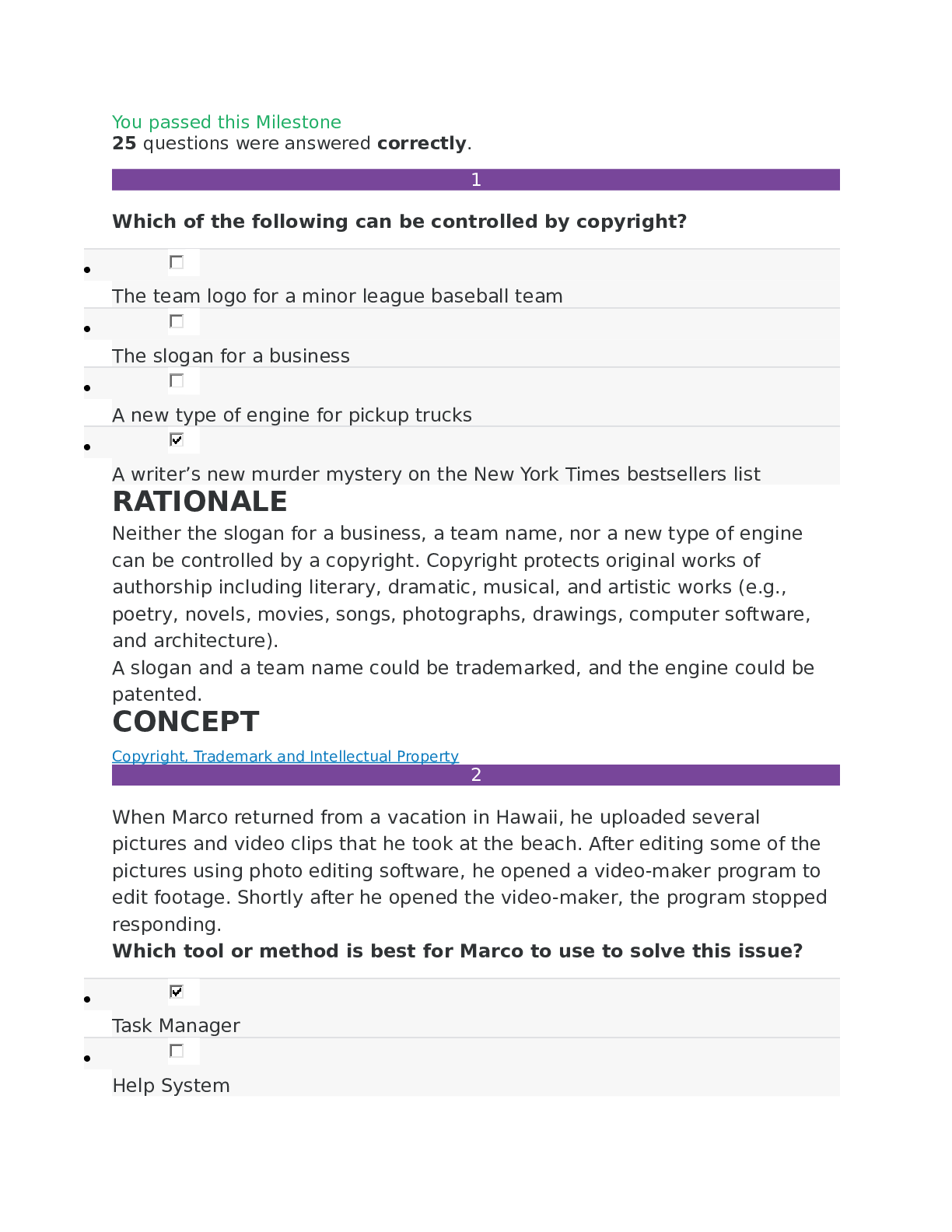*NURSING > EXAM > ATI RN Mental Health Online Practice 2019 B - WeeK 10 ALL ANSWERS 100% CORRECT LATEST SOLUTION GUARA (All)
ATI RN Mental Health Online Practice 2019 B - WeeK 10 ALL ANSWERS 100% CORRECT LATEST SOLUTION GUARANTEED GRADE A+
Document Content and Description Below
A nurse is reviewing the medication administration record for a client who is experiencing adverse effects of chlorpromazine. The nurse should administer benztropine to relieve which of the following... adverse effects? A. Blurred vision B. Orthostatic hypotension C. Dry mouth D. Acute dystonia - The nurse should administer benztropine, an anticholinergic agent, to relieve acute dystonia, which is an extrapyramidal adverse effect of chlorpromazine. A nurse is planning discharge teaching with a family member of a client who has diagnosis of depression. Which of the following information about relapse should the nurse include? A. Additional acute episodes of depression are unlikely following inpatient care. B. Early identification of changes, such as decreased social involvement, is important. C. Medication compliance will prevent further need for inpatient hospitalization. D. It is helpful to regularly reinforce to the client that things will get better. B. Early identification of changes, such as decreased social involvement, is important. Decreased social involvement is a manifestation of depression, and early identification of findings can lead to early intervention. A nurse is assessing a client who is experiencing opioid withdrawal. Which of the following manifestations should the nurse expect? A. Sedation B. Rhinorrhea C. Bradycardia D. Hypothermia Rhinorrhea - The nurse should expect the client who is experiencing opioid withdrawal to have rhinorrhea and flu-like manifestations such as yawning, sneezing, and abdominal pain. A nurse is assessing a family's dynamics during a counseling session. The nurse should recognize which of the following findings as an indication of a boundary issue? A. An adolescent family member who questions parental authority B. A family with three generations in the same household C. Older children who are responsible for their younger siblings D. Two adults and their children from prior relationships in the same household C. Older children who are responsible for their younger siblings This is an example of enmeshed boundaries in which there are no distinctions between the roles of family members. A nurse is assisting a client who has a terminal illness adjust to progressive loss of independence. Which of the following statements by the client indicates acceptance of her illness? A. "I am going to order a wheelchair for when I'm unable to walk." B. "I am going to stop paying my bills since I won't be around much longer." C. "I wish you would go take care of somebody who actually needs you." D. "I am sure I'm going to be able to continue to care for myself without help." A. "I am going to order a wheelchair for when I'm unable to walk." The client is recognizing the reality of continued loss of independence and is anticipating the need for assistive devices, which indicates the behavioral response of acceptance. A nurse is caring for a child who is taking methylphenidate. The nurse should monitor the child for which of the following findings as an adverse effects of methylphenidate? A. Weight gain B. Tinnitus C. TachycardiaD. Increased salvation C. Tachycardia - The nurse should monitor the child for tachycardia, which is an adverse effect of methylphenidate. A nurse is creating a plan of care for a client who has been placed in seclusion after threatening to harm others or the unit. Which of the following interventions should the nurse include in the plan? A. Document the client's behavior every 8 hr. B. Limit the client's fluid intake to 50 mL/hr. C. Renew the prescription for the client every 4 hr. D. Toilet the client every 4 hr. C. Renew the prescription for the client every 4 hr. The nurse should assess the client's behavior frequently during seclusion and should renew the prescription for seclusion for an adult client every 4 hr, for a maximum of 24 hr. A nurse observes a client on a mental health unit pushing on the locked unit door. Which of the following statements should the nurse make? A. "It appears as though you would like to open the door." B. "You will feel more comfortable after you've been here for a while." C. "It is okay to not want to be here." D. "You really shouldn't be pushing on the door." A. "It appears as though you would like to open the door." This statement is an example of the therapeutic technique of making observations. This technique encourages the client to notice the behavior so that they can describe thoughts and feelings related to that behavior. A nurse is education the parent of a child who has a new diagnosis of autism spectrum disorder. Which of the following manifestations of this disorder should the nurse include in the teaching? A. Fear of abandonment B. Motor and verbal tics C. Hostile behavior D. Language delay - The nurse should identify that language delays are a manifestation of autism spectrum disorder. A nurse is discussing a 12-step program with a client who has alcohol use disorder and is in an acute care facility undergoing detoxification. Which of the following information should the nurse include in the teaching? A. The program will help the client accept responsibility for the disorder. B. The client should obtain a sponsor before discharge for an increased chance of recovery. C. The client will need to identify individuals who have contributed to the disorder. D. The program will need a prescription from the client's provider prior to attendance. B. The client should obtain a sponsor before discharge for an increased chance of recovery. The nurse should teach the client that peer support has been shown to increase program attendance and the chances of recovery. If the client does not have a sponsor, they can be assigned one when they begin attending the program. A charge nurse on a mental health unit is discussing client rights with a newly licensed nurse. Which of the following statements should the charge nurse make? A. "Clients can't refuse to take medications if they are admitted involuntarily." B. "You can notify a client's family if they are admitted involuntarily." C. "Clients who are admitted involuntarily maintain the right to give informed consent for procedures." D. "You can remove a client's privileges if they are admitted involuntarily and refuse to attend therapy sessions." C. "Clients who are admitted involuntarily maintain the right to give informed consent for procedures." Clients who are admitted involuntarily maintain the right to give informed consent for treatment. They also have the right to give informed consent for procedures. A nurse in the emergency department is caring for four clients. Which of the following clients is the nurse required to report as a potential victim of abuse? A. A school-age child who has bruises on the knees B. An older adult client who is bedbound and has a stage IV pressure ulcer - A stage IV pressure ulcer on an older adult client who is bedbound can indicate physical neglect and warrants mandatory reporting. C. An adolescent who has a vaginal candida infection D. A young adult who is pregnant and has a sprained ankleA nurse is admitting a client who has major depressive disorder and a new prescription for tranylcypromine. Which of the following over-the-counter medications that the client reports taking should alert the nurse to a potential adverse reactions? A. Lansoprazole B. Naproxen - No adverse interaction w/ this drug. C. Magnesium hydroxide D. Phenylephrine - Clients who are taking tranylcypromine, an MAOI antidepressant, should not take phenylephrine and other over-the-counter medications for sinus congestion, colds, or allergies due to their actions on the sympathetic nervous system, which can result in severe hypertension. A nurse is planning care for a client who has generalized anxiety disorder. At which of the following levels of anxiety should the nurse plan to teach the client relaxation techniques? A. Panic B. Moderate C. Severe D. Mild - The nurse should plan to teach the client relaxation techniques during the mild level of anxiety. This is when the client will be able to concentrate and process information. A nurse is planning care for a client who has bipolar disorder and is experiencing mania. Which of the following interventions should the nurse include in the plan of care? A. Encourage the client to participate in group therapy B. Instructing the client to avoid napping during the day C. Offer the client high-calorie finger foods frequently - The nurse should frequently offer the client high-calorie foods that can be eaten while the client is on the go. Clients experiencing mania might be unable to sit down for meals and can experience weight loss and dehydration. D. Decrease the client's daily fiber intake A nurse is counseling an adolescent who has anorexia nervosa and reports excessive laxative use and fear of gaining weight. The client states, "I'm so fat I can't even stand to look at myself." Which of the following therapeutic responses demonstrates the nurse's use of summarizing? A. "You've discussed several concerns about your weight. Let's go back and talk about your belief that you are fat." B. "You're saying that you think you are fat and are using laxatives because you are afraid of gaining weight." C. "You don't want to look at yourself because you think you are fat." D. "You and I can work together to overcome your fears of gaining weight." B. "You're saying that you think you are fat and are using laxatives because you are afraid of gaining weight." The nurse is using the therapeutic technique of summarizing to review the key points of the discussion. A school nurse is assessing a school-age child who experienced the traumatic loss of a parent 8 months ago. Which of the following findings should the nurse identify as an indication that the child is experiencing post-traumatic stress disorder (PTSD)? A. Clinging behaviors directed toward a teacher B. Increased time spent sleeping C. Intense focus on school work D. Lack of interest in an upcoming holiday - The child who has PTSD will have negative moods and difficulty remembering aspects of the traumatic event. The child can also have a loss of interest or lack of participation in significant activities and events such as holidays. A nurse is planning discharge teaching for a client who has severe schizoaffective disorder. The nurse should identify that which of the following treatment options can offer interdisciplinary services for the client at home? A. Community mental health center B. Mental health day program C. Partial hospitalization program D. Assertive community treatment - Assertive community treatment provides comprehensive, community-based services to clients who have severe mental illness based upon individualized needs. Services are available in any setting, including the client's home, 24 hr per day and provide crisis intervention, medication services, and advocacy.A nurse in an emergency department is caring for a female adolescent who has a diagnosis of bulimia nervosa and has a fainting episode during a ballet performance. Which of the following statements by the parent acknowledges the client's diagnosis? A. "She works so hard at ballet. Will she still be able to perform?" B. "She won't let me take the trash from her room. I'm concerned about what she has in there." C. "She told me she was tired, so I did her chores for her today." D. "She is happier with her appearance now that she's lost some weight." B. "She won't let me take the trash from her room. I'm concerned about what she has in there." The client might be binge eating and attempting to hide food containers, which is a common behavior among clients who have bulimia nervosa. The parent's statement indicates awareness of the client's behavior. A nurse in a mental health facility is caring for a client who has schizophrenia. Which of the following findings places the client at the greatest risk for self-directed injury or injuring others? A. Inability to communicate with others B. Feelings of absence of self-worth C. Lack of motivation to perform daily tasks D. Command hallucinations - A client who has schizophrenia and is experiencing command hallucinations can hear voices telling them to hurt themselves or others. Therefore, a client who is experiencing command hallucinations is at the greatest risk for self-directed injury or injuring others. A nurse is caring for a client who is experiencing a panic attack. Which of the following actions should the nurse take? A. Orient the client to person, place, and time B. Assist the client with deep-breathing exercises - Relaxation techniques, such as deep, abdominal breathing [Show More]
Last updated: 2 years ago
Preview 1 out of 12 pages
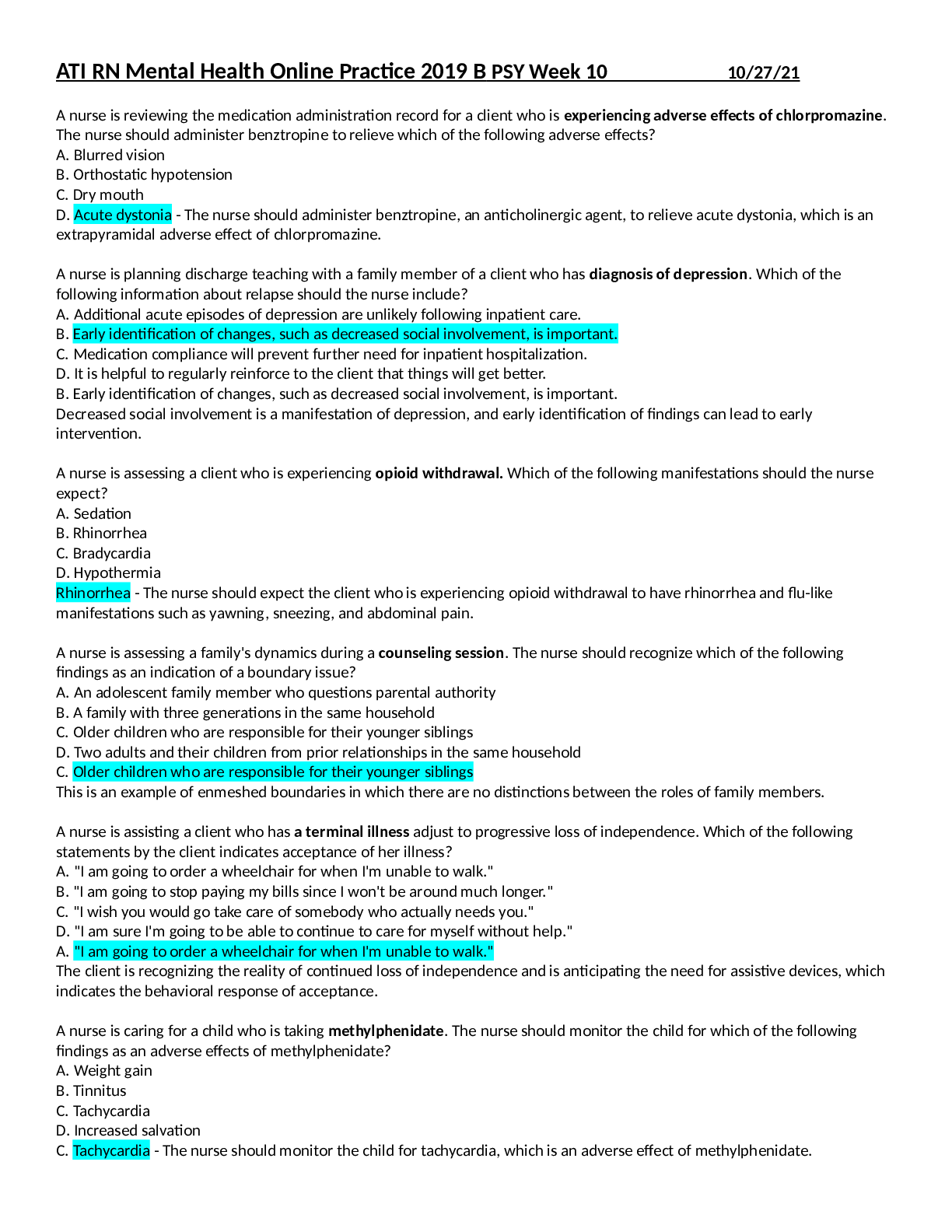
Buy this document to get the full access instantly
Instant Download Access after purchase
Buy NowInstant download
We Accept:

Reviews( 0 )
$11.50
Can't find what you want? Try our AI powered Search
Document information
Connected school, study & course
About the document
Uploaded On
May 12, 2022
Number of pages
12
Written in
Additional information
This document has been written for:
Uploaded
May 12, 2022
Downloads
0
Views
100

